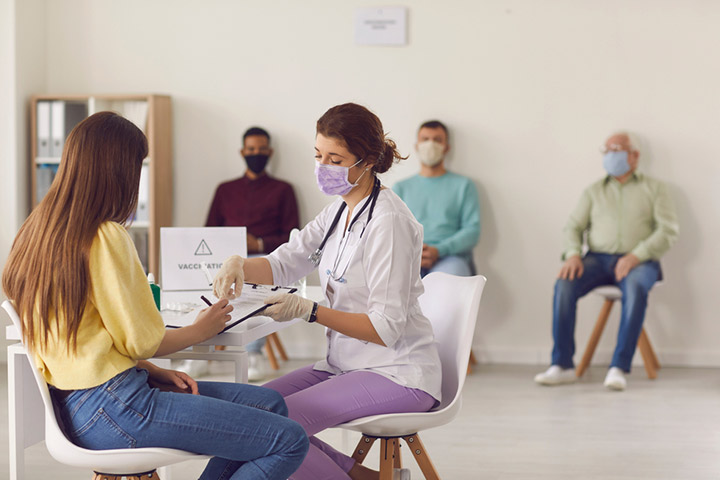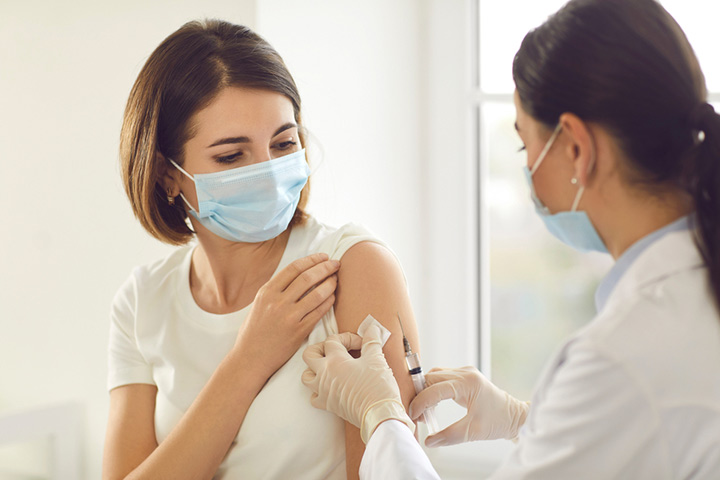
Image: Shutterstock
With the vaccine still being in its nascent stage, many questions surround its side effects. Before injecting you, the medical professional will list the possible side effects you may experience. This includes mild fever, runny nose, headache, and soreness (1). However, they leave behind one crucial thing — what about the impact it may have on your period?
Women worldwide have been freaking out about the possibility of the vaccine messing up their period, thereby the reproductive system. It is only natural that you have these worries. Let’s look at what the experts have to say.
What’s Been Observed So Far
A report from the Centers For Disease Control And Prevention quite blatantly stated that women experience more severe side effects than men after taking the COVID-19 jab (2). Women who were recently vaccinated reported significant changes in their menstrual cycle. These changes include abnormal bleeding or earlier periods.
A report from BBC News stated that there could be a possible connection between the vaccine and the reproductive system. The lining of the womb contains several immune cells. These immune cells are crucial for the maintenance of the uterus. It helps to build up or break down the lining in the uterus. The vaccine primarily affects your immune system, and immune cells are present all over the body. Since the vaccine targets the immune cells across the body, it affects the immune cells in the lining of the womb, too (3).
However, the report goes on to say that these side effects are temporary, and although alarming, they should not have any long-term side effects on your menstrual cycle (4).
Does This Have An Impact On Pregnancy?
The Centers For Disease Control And Prevention gives the green signal for those who are looking to conceive. It says that there is no conclusive evidence that states the vaccine can cause fertility problems. It goes on to say that there is no need to delay or avoid planning for pregnancy once you have been vaccinated (5).
It is worth noting that the CDC states that if you have had a severe allergic reaction after taking the first dose of your vaccine, you must avoid taking the second dose. A severe allergic reaction or anaphylaxis has to be treated with epinephrine. Consult your doctor immediately if you notice the onset of a severe allergic reaction (6).
Taking Care After Your Shots
The common side effects of the COVID-19 vaccine include fatigue, fever, headache, body pain, nausea, and chills. You might also experience soreness in the arm that got injected. While you might be tempted to grab a painkiller, antihistamine, or any other medication to address the discomfort, it is best to avoid this. Talk to your doctor, and do not self-medicate. The doctor will prescribe the proper medication to help relieve your symptoms. However, these should go away on their own after a few days (7).
It has been observed that the side effects are more noticeable after your second COVID-19 shot. This, too, is normal. It is your body’s way of building a defense. You should be back to normal in a few days (8).
The pandemic has taken the world by storm. This, along with the fact that we have information at our fingertips, is a boon and a bane. The good thing is, we have easy access to information that can help. The bad news is that there is an equal number, if not more, of misinformation as well. Unverified reports of the vaccine being dangerous to your menstrual health are on the rounds. Do not rely on such information. Taking the vaccine is a step in the right direction — unless you have specific health concerns and your doctor advises you otherwise. Have you taken the vaccine recently? Share your thoughts with us!















